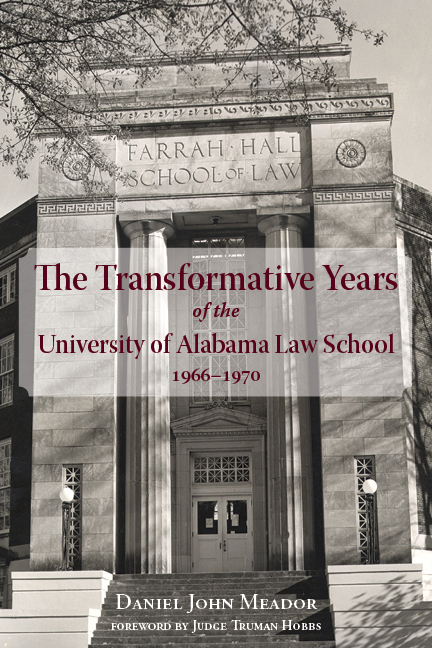 “Alabama is a better state and the University of Alabama Law School is an infinitely better place due to [Daniel Meador’s] stellar four years of splendid service,” a recent profile in the Alabama Lawyer‘s November 2012 issue concludes.
“Alabama is a better state and the University of Alabama Law School is an infinitely better place due to [Daniel Meador’s] stellar four years of splendid service,” a recent profile in the Alabama Lawyer‘s November 2012 issue concludes.
In reviewing Meador’s book The Transformative Years of the University of Alabama Law School: 1966-1970, University of Alabama alumnus Robert Potts’s examines Meador’s tenure at the law school and how Meador contributed to the school’s betterment.
Potts writes that after World War II, “the scholarly productivity coming from the law school as a whole was minimal,” with low admission standards, minimal diversity, and not much participation in law organizations by students or staff. Meador had graduated from the University of Alabama, and he agreed to return in 1966 as dean of the law school to help right the school. Potts relates that Meador “brought with him a vision for greatness that elevated the hopes and aspirations of its existing students, many of the faculty and, especially, the alumni of the school. Nevertheless, he encountered significant obstacles as he sought to implement his reforms.”
Meador describes the high and low points of his work to reform the school in Transformative Years. He successfully raised the law school’s standards, increased the enrollment of African American students, created new fundraising opportunities for the school, and helped the law library be designated as a U.S. Government Depository.
Though Meador left the school in 1970 after clashing with the incoming administration, Potts and others credit Meador with the law school’s turnaround. “Those of us who were fortunate enough to study at his feet and to be imbued with his grand vision for the law school, lawyer-leaders and the legal profession,” Potts writes, “have profited immensely for his having passed our way.”
Read the full article from Alabama Lawyer.
The Transformative Years of the University of Alabama Law School is available from NewSouth Books, Amazon, or your favorite bookstore.
